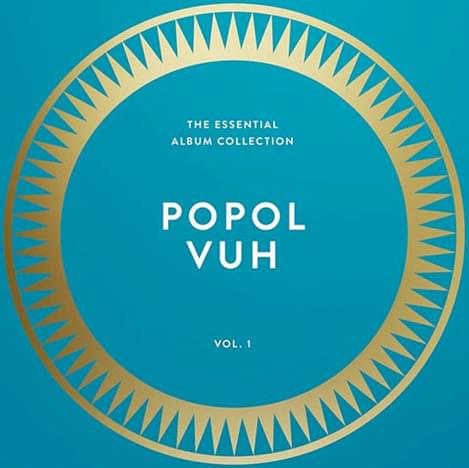Popol Vuh's new reissues showcase the groundbreaking Germans' uncompromising vision
"The Essential Album Collection Vol. 1"

Unlike their celebrated and likeminded contemporaries such as Can and Neu!, Popol Vuh wasn't really a band at all in the conventional sense of the term. Comprised of a revolving cast of collaborators centred around classically trained keyboardist and composer Florian Fricke, Popol Vuh rarely played live and - as the five albums from the band's earliest years collected here attest - never settled into a house style. Instead, they opted to explore different styles, sounds and settings according to the evolving interests of Fricke, their records united more by a sense of spiritual yearning and a quest for musical rapture than any particular instrumentation or genre affiliation.
Conceived after Fricke was commissioned to produce an album centred on the Moog synthesizer, Popol Vuh's 1970 debut Affenstunde remains a disorientating, otherworldly slab of early electronic music. Comprised almost entirely of the tone-bending Moog, with percussion and field recordings of natural sounds for added texture, the somewhat unsettling outcomes vaguely resemble very early Kraftwerk and Cluster. However, the album's murky, foreboding drones are very much a one-off. By the time the subterranean percussive clatter of the semi-endless title track kicks in after the disembodied drift of the three-part opener, bringing with it the vibe of eavesdropping on the forbidden rituals of a cave-dwelling cult, we're faced with a hypnotic intent that arguably went on to inspire - directly or indirectly - a certain brand of minimalist electronic music.
Next to this, 1973's Hosianna Mantra feels warm and welcoming like the first rays of a particularly bright day. By now, the Moog and other electronic elements had been shelved in favour of entirely acoustic instrumentation, with Djong Yun's clear and pristine vocals often in the spotlight, and guitar, flute and what sounds like the grounding drone of sitar also featuring prominently. Now on piano, Fricke's interest in spirituality had moved from the ancient Mayan beliefs that gave the groups its name to Christianity. He'd also uncovered a potent new weapon: melody. The combined outcome of these two interests is reflected in the caressing, contemplative, often breathtakingly beautiful music that frequently nods towards the solemn moods and sternly pretty melodies of Lutheran hymns, never more so than on the deeply moving, minimalist folk prayer “Abschied”. Add to this a touch of progressive rock's stretching (see shape-shifting opener "Ah!", which also foresees the recent movement of ambient-inclined neoclassical composers whose works seem similarly designed to be played in churches) and you've two sides of absolute perfection; even the bonus track, a tamboura-powered reimagining of "Ave Maria", is pure magic.
1974's Einsjäger & Siebenjäger is as close to what we would typically associate with conventional rock music as Popol Vuh were ever likely to get. Already a key component on Hosianna Mantra, Amon Düül II guitarist Daniel Fichelscher is all over the record, multi-tracking jousting quicksilver guitar lines that are far closer to the exploratory spirit of Grateful Dead's Jerry Garcia and improv-friendly contemporary compatriots Ash Ra Tempel (even if the overall mode is one of pastoral contemplation, as opposed to psychedelic mind-expansion and freak-flag-flying meltdowns) than the empty showing-off of prog-rock, even as the sprawling compositions occasionally point towards that direction. On the other hand, there's the sublime, stripped-down "Morgengrüß", a luminant folk-rock masterpiece that harks back to Hosianna Mantra's uncomplicated beauty, echoes of which can be heard, at least faintly, in the output of bands like Dungen and Midlake.
Apart from their regular albums, Popol Vuh produced considerable amounts of film music (a dependable source of income for deeply marginalised 'Krautrock' bands), including five soundtracks for films by the legendary German auteur Werner Herzog. Two of these soundtracks round up this box. Electronic textures return for the soundtrack to Aguirre, which was released as a standalone record in 1976, after Herzog’s visionary account of the gradual descent into madness and total destruction by a group of would-be conquistadors turned out to be a commercial as well as an artistic success. Richly evocative of the film's masterful blend of majestic natural beauty and impending doom, it's a classic of its genre, every bit as powerful as the images it was intended to support. Although a more meandering beast, with unexpected detours into rattling sitar drones and what sounds close to traditional Greek folk music, 1978's Nosferatu - this time around, Fricke's budget stretched to an actual choir - is similarly potent: brightly lit moments of melodic prettiness aside, present perhaps to remind us that the hideous undead beast at the centre of Herzog’s unsettling film was once a human being too, it's hard not to whiff the doom-laden, none-more-black, ultra-heavy drone stylings of Sunn O))) and theatrical, bombastic structures of Circle amidst the cymbal-clattering, creeping dread of "Brüder des Schattens".
Get the Best Fit take on the week in music direct to your inbox every Friday

Tunde Adebimpe
Thee Black Boltz

Julien Baker & TORRES
Send A Prayer My Way

Bon Iver
SABLE, fABLE





